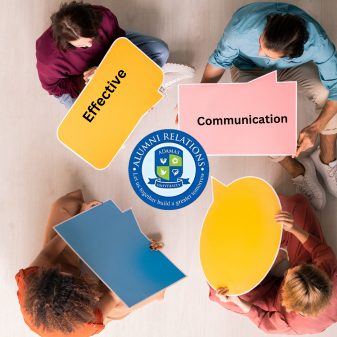Effective Communication: The Key to Building Strong Relationships

The Road to Recovery: How the World is Healing Post-Pandemic
October 15, 2020Every time I sit down with a client or have a conversation with a colleague, I’m reminded of the power of words. How we communicate—what we say, how we say it, and even the pauses in between—has the ability to shape relationships, build trust, and drive positive outcomes. Working as a Deputy Manager at ICICI Bank, I’ve come to realize that communication is the core of what I do. But it’s not just about transferring information; it’s about understanding and connecting.
Every time I sit down with a client or have a conversation with a colleague, I’m reminded of the power of words. How we communicate—what we say, how we say it, and even the pauses in between—has the ability to shape relationships, build trust, and drive positive outcomes. Working as a Deputy Manager at ICICI Bank, I’ve come to realize that communication is the core of what I do. But it’s not just about transferring information; it’s about understanding and connecting.
Here, I would like to share some insights and personal reflections on what makes communication truly effective, with the hope that these tips can benefit anyone seeking to enhance their interpersonal skills.
Listen More Than You Speak It may sound counterintuitive, but one of the most critical aspects of effective communication is listening. People often focus on what they want to say next rather than truly listening to the person speaking. Active listening requires attention, patience, and empathy. It’s about putting aside distractions, giving full attention to the other person, and responding thoughtfully. When I first joined ICICI Bank, I thought that communicating effectively meant being articulate and clear in my speech. While these qualities are indeed important, I quickly realized that building trust with clients and colleagues starts with listening. By genuinely understanding their concerns and needs, I could provide solutions that were not only effective but also tailored to their specific situations. Listening made my clients feel valued, which in turn helped build stronger relationships.
Be Clear and Concise In today’s digital age, people are bombarded with information from all sides. Long, convoluted messages can easily get lost or misinterpreted. Clarity and brevity are essential for effective communication. Whether it’s an email, a presentation, or a casual conversation, get to the point without unnecessary jargon or fluff. When communicating with clients or team members, I make it a point to simplify complex financial concepts. At ICICI Bank, we deal with intricate products and policies, but explaining them in simple, relatable terms helps clients feel more comfortable and confident in their financial decisions. Concise communication ensures that your message is understood, saving time and minimizing misunderstandings.
Adapt to Your Audience One size does not fit all in communication. The way you communicate with a senior manager will differ from how you approach a colleague or a client. Understanding your audience and tailoring your message accordingly is crucial. For instance, a client might not have in-depth knowledge of financial jargon, so I avoid technical terms when explaining products to them. Conversely, when speaking to a financial analyst or a team member in the banking sector, I use more industry-specific language. Adapting your communication style also extends to tone and delivery. In certain situations, a formal tone may be appropriate, while others may call for a more conversational approach. By being mindful of your audience’s preferences and knowledge levels, you can ensure your message resonates more effectively.
Use Positive Body Language Non-verbal cues like body language, eye contact, and facial expressions can make a huge difference in how your message is received. Effective communication isn’t just about words; it’s also about how you convey them. Maintaining eye contact shows attentiveness, while a genuine smile can make interactions more approachable and friendly. During client meetings, I make a conscious effort to display open body language – arms uncrossed, nodding when appropriate, and leaning slightly forward to show engagement. Positive body language helps establish rapport and builds trust. Even on virtual calls, simple actions like looking into the camera and nodding occasionally can make the interaction feel more personal and sincere.
Ask for Feedback Feedback is a powerful tool in enhancing communication skills. Often, we assume that our messages are being received as intended, but the reality may differ. Asking for feedback not only helps in understanding how your communication is perceived but also fosters an environment of open dialogue.
Empathy: Putting Yourself in Others’ Shoes Empathy is the cornerstone of effective communication. By putting yourself in someone else’s position, you gain insight into their feelings and perspectives, which allows for a more meaningful exchange. Empathy is especially important in client-facing roles like mine, where understanding clients’ concerns and emotions can lead to better solutions. Recently, a client approached me with concerns about a financial decision. Rather than immediately providing a solution, I took the time to understand his fears and anxieties. This empathetic approach helped me address his concerns more effectively, ultimately building his trust and confidence in the bank’s services. Empathy not only enhances communication but also strengthens relationships and promotes loyalty.
Effective Communication as a Lifelong Journey- Communication is more than just exchanging words; it’s about making a connection, building trust, and fostering relationships. Effective communication is a journey, one that requires self-awareness, empathy, and a commitment to continuous improvement. For me, every interaction is an opportunity to learn and grow as a communicator. I encourage everyone to view communication not merely as a skill, but as a way to build meaningful connections. Whether you’re speaking to clients, colleagues, or friends, remember that how you communicate can have a lasting impact. Let’s strive to communicate not just to be heard but to be understood, to connect, and to make a positive difference in each other’s lives.
By- Sagnik Bhaduri, BA-Psychology, 2018 Dy Manager-ICICI Bank


